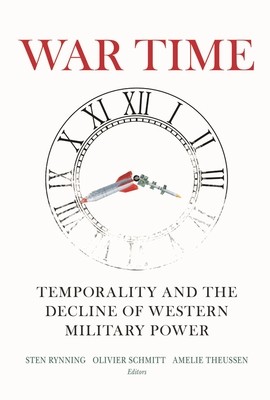
- We will send in 10–14 business days.
- Publisher: Brookings Inst. Press/Chatham House
- ISBN-10: 0815738943
- ISBN-13: 9780815738947
- Format: 14.7 x 22.9 x 2.8 cm, minkšti viršeliai
- Language: English
- SAVE -10% with code: EXTRA
War Time (e-book) (used book) | bookbook.eu
Reviews
Description
Perceptions of time contributed to recent Western military failings
The "decline of the West" is once again a frequent topic of speculation. Often cited as one element of the alleged decline is the succession of prolonged and unsuccessful wars--most notably those waged in recent decades by the United States. This book by three Danish military experts examines not only the validity of the speculation but also asks why the West, particularly its military effectiveness, might be perceived as in decline.
Temporality is the central concept linking a series of structural fractures that leave the West seemingly muscle-bound: overwhelmingly powerful in technology and military might but strategically fragile. This temporality, the authors say, is composed of three interrelated dimensions: trajectories, perceptions, and pace.
First, Western societies to tend view time as a linear trajectory, focusing mostly on recent and current events and leading to the framing of history as a story of rise and decline. The authors examine whether the inevitable fall already has happened, is underway, or is still in the future.
Perceptions of time also vary across cultures and periods, shaping socio-political activities, including warfare. The enemy, for example, can be perceived as belong to another time (being "backward" or "barbarian"). And war can be seen either as cyclical or exceptional, helping frame the public's willingness to accept its violent and tragic consequences.
The pace of war is another factor shaping policies and actions. Western societies emphasize speed: the shorter the war the better, even if the long-term result is unsuccessful. Ironically, one of the Western world's least successful wars also has been America's longest, in Afghanistan.
This unique book is thus a critical assessment of the evolution and future of Western military power. It contributes much-needed insight into the potential for the West's political and institutional renewal.
EXTRA 10 % discount with code: EXTRA
The promotion ends in 21d.10:47:06
The discount code is valid when purchasing from 10 €. Discounts do not stack.
- Publisher: Brookings Inst. Press/Chatham House
- ISBN-10: 0815738943
- ISBN-13: 9780815738947
- Format: 14.7 x 22.9 x 2.8 cm, minkšti viršeliai
- Language: English English
Perceptions of time contributed to recent Western military failings
The "decline of the West" is once again a frequent topic of speculation. Often cited as one element of the alleged decline is the succession of prolonged and unsuccessful wars--most notably those waged in recent decades by the United States. This book by three Danish military experts examines not only the validity of the speculation but also asks why the West, particularly its military effectiveness, might be perceived as in decline.
Temporality is the central concept linking a series of structural fractures that leave the West seemingly muscle-bound: overwhelmingly powerful in technology and military might but strategically fragile. This temporality, the authors say, is composed of three interrelated dimensions: trajectories, perceptions, and pace.
First, Western societies to tend view time as a linear trajectory, focusing mostly on recent and current events and leading to the framing of history as a story of rise and decline. The authors examine whether the inevitable fall already has happened, is underway, or is still in the future.
Perceptions of time also vary across cultures and periods, shaping socio-political activities, including warfare. The enemy, for example, can be perceived as belong to another time (being "backward" or "barbarian"). And war can be seen either as cyclical or exceptional, helping frame the public's willingness to accept its violent and tragic consequences.
The pace of war is another factor shaping policies and actions. Western societies emphasize speed: the shorter the war the better, even if the long-term result is unsuccessful. Ironically, one of the Western world's least successful wars also has been America's longest, in Afghanistan.
This unique book is thus a critical assessment of the evolution and future of Western military power. It contributes much-needed insight into the potential for the West's political and institutional renewal.


Reviews